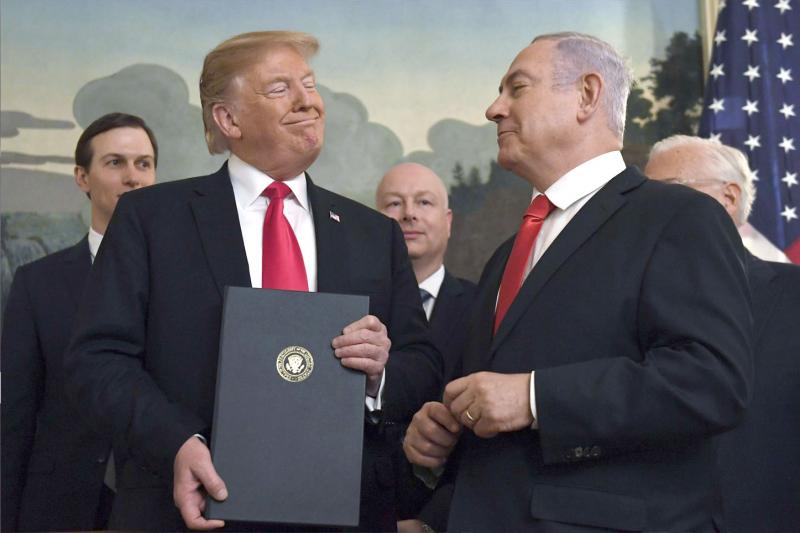Trump versus Palestinians: The ‘Great Man’ theory at work

Irreversible damage. President Donald Trump smiles at Israeli Prime Minister Benjamin Netanyahu (R) after signing an official proclamation formally recognizing Israel’s sovereignty over the Golan Heights, in the Diplomatic Reception Room at the White House
Trump has decisively removed a key brick in the wall that protected Palestinian hopes of a sovereign state and self-determination.
Whatever happens with Donald Trump in the 2020 US presidential election, one thing seems unlikely to change: The US Embassy in Israel will remain in Jerusalem. It will not be moved back to Tel Aviv even if Trump is not re-elected.
The heaving field of Democratic presidential candidates has criticised Trump’s decision to move the embassy to Jerusalem. However, none of those candidates say they would return the US Embassy to its previous, less controversial position should they win the White House.
Instead, they offer a bouquet of ideas to restore balance to the US relationship with the Palestinians. Former US Vice-President Joe Biden, for instance, would reopen the consulate in East Jerusalem to “engage the Palestinians.” In common with many of the other Democratic hopefuls, Biden has said he would return the United States to encouraging a two-state solution.
Almost all the Democrats vying to take Trump’s job offer suggestions on how to restore US support to the Palestinians and to somehow make them feel less marginalised.
Some suggest a freeze on the process of building the new US Embassy in Jerusalem. Others want to establish a US diplomatic post in Jerusalem accredited to the Palestinian Authority. Still others stress that US policy should ensure Jerusalem will be a shared capital for Israel and the future Palestinian state. Almost everyone supports reopening the Palestine Liberation Organisation office in Washington and the renewal of funding to the UN Relief and Works Agency for Palestine Refugees in the Near East.
What they don’t say is the US Embassy will be moved back to Tel Aviv under a post-Trump administration. They cite various reasons, not least whether it would be “practical or productive” to undo Trump’s high-handed 2017 decision to wilfully ignore international law, multiple UN resolutions and the principle of natural justice to legitimise the annexation of territory seized in war.
In other words, even if Trump were no longer president of the United States on inauguration day January 2021, his unilateral recognition of Jerusalem as Israel’s capital would stand unchallenged.
Thus, will Trump have changed the course of history. One man, by one impetuous, grossly unfair act, will have altered the parameters of the long-running debate over a just solution to the Palestinian-Israeli conflict. This is a contemporaneous example of the practical effects of the “Great Man” theory of history, which applies to individuals whose character, inclinations and behaviour affect the course of history for good or ill.
Many dispute the “Great Man” theory, preferring to see history as the culmination of large, long-term forces. France’s Annales school of historical thought, for example, sees change developing across sections of society rather than emanating from particular individuals.
One of Annales’ founders, Fernand Braudel, who wrote a sweeping account of the Mediterranean, said events were brief, nervous oscillations — the “froth” on the waves of time — and that decisions taken by powerful individuals were insignificant “foam” on the ocean’s surface.
Surely this cannot be true with respect to Trump and the Palestinians. However ineffectual or “foam”-like his promised “Deal of the Century” for the Palestinian-Israeli issue and whatever this US president does or does not do about the situation, Trump has decisively removed a key brick in the wall that protected Palestinian hopes of a sovereign state and self-determination.
He has made it impossible to credibly talk of a two-state solution. He has killed that dream by enabling Binyamin Netanyahu’s government to assert Israel’s right to Jerusalem even as it posits the absorption of most of the West Bank’s settlements into the state of Israel.
Clearly, the “Great Man” theory has much to recommend it. The best and the worst choices made by those we call the “great men” of the 20th century triggered revolutions, dismantled empires, enshrined egalitarian laws or the complete reverse. Trump, too, has been decisive for the Palestinian people.
Originally published in The Arab Weekly.com

